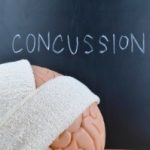September is Healthy Aging Month, so we present a selection of our articles discussing aging and age-related health conditions, including concussions, traumatic brain injury, incontinence, PTSD, and obesity.
Aging is an inevitable part of life, but how you age is really within your control. Partaking in a healthy lifestyle can help you age more gracefully.
 Concussion (traumatic brain injury) and head impact may accelerate brain aging
Concussion (traumatic brain injury) and head impact may accelerate brain aging
Advertisement
Concussion (traumatic brain injury) and head impact may accelerate brain aging. A concussion is a traumatic brain injury which alters the way the brain functions. Effects of concussion are usually temporary, but continuous head trauma or lack of healing can have long-lasting effects.
Aside from a direct blow to the head, concussions can also happen when the head and upper body are being aggressively shaken. Some symptoms of concussion include headache, concentration problems, memory problems, balance and coordination problems, and loss of consciousness.
If proper care is taken, a person can fully recover from a concussion, but it’s important to prevent future incidents to avoid complications. Continue reading…
 Bladder and urinary tract health: Effects of aging and incontinence
Bladder and urinary tract health: Effects of aging and incontinence
Bladder and urinary tract health is an important matter, particularly as we age. Aging can significantly impact the bladder and urethra, so it’s important to understand these changes to avoid complications and know how to address them.
The decline of kidney function begins as early as the age of 40. The bladder and the urethra also undergo certain age-related changes, such as the diminishing maximum volume of urine the bladder is able to hold. The ability to hold urine may also be negatively impacted, increasing the risk of urine leaks. The rate of urine release starts slowing down, too.
Women experience age-related urinary health problems more commonly than men. Pregnancy and childbirth play a large role here. Plus, by the time women hit menopause, their estrogen levels start falling, and these hormonal fluctuations do not always go unnoticed for the urinary tract health. Continue reading…
 Post-traumatic stress disorder (PTSD) in veterans may lead to accelerated aging, raise early death risk
Post-traumatic stress disorder (PTSD) in veterans may lead to accelerated aging, raise early death risk
Post-traumatic stress disorder (PTSD) in veterans may lead to accelerated aging and raises the risk of early death. PTSD is a psychological disorder associated with severe trauma, which contributes to depression, anxiety, eating disorders, and substance abuse. PTSD can affect anyone who has experienced trauma, but it is often particularly associated with veterans coming back from war.
Researchers at University of California, San Diego School of Medicine, and Veterans Affairs San Diego Healthcare System have found that PTSD not only affects the individual mentally, but it can also accelerate aging and increase the risk of early death.
Senior author Dilip V. Jeste said, “This is the first study of its type to link PTSD, a psychological disorder with no established genetic basis, which is caused by external, traumatic stress, with long-term, systemic effects on a basic biological process such as aging.” Continue reading…
 Obesity triggers premature aging of the brain
Obesity triggers premature aging of the brain
Being overweight or obese has been tied to a number of negative health outcomes already, so it’s of little surprise that the latest findings have uncovered yet another side effect of obesity – it’s bad for your brain. The findings of the study suggest that being overweight or obese can trigger premature aging of the middle-aged brain. The study examined the impact of extra weight on the brain’s white matter that facilitates intracerebral communication.
White matter is known to shrink with age, but the study found that the amount of white matter in an overweight 50-year-old was similar to that of a 60-year-old lean individual.
Advertisement
Lead author Lisa Ronan said, “Obesity is associated with a host of biological processes that are seen in normal aging. And, therefore, we hypothesized that obesity may in fact compound the effects of aging that we see in the brain. This is what we found.” Continue reading…
 Keeping brain alert and active is key to a healthy aging mind
Keeping brain alert and active is key to a healthy aging mind
Maintaining a healthy aging mind is one of the greatest challenges that health authorities are facing, as the numbers of aging adults are on the rise. According to researchers, the easiest and most effective way to keep the mind healthy is to take on a new mental challenge such as quilting, cross-stitching, painting, or even digital photography. These types of activities maintain cognitive vitality. The results of the study are available in Restorative Neurology and Neuroscience.
While this previous evidence suggests that engaging in enriching lifestyle activities and other enjoyable activities may be associated with maintaining cognitive vitality, there was no science behind the understanding. It was always a cause-and-effect relationship. The mechanism of how these activities improve cognitive enhancement has always been poorly understood. Continue reading…
